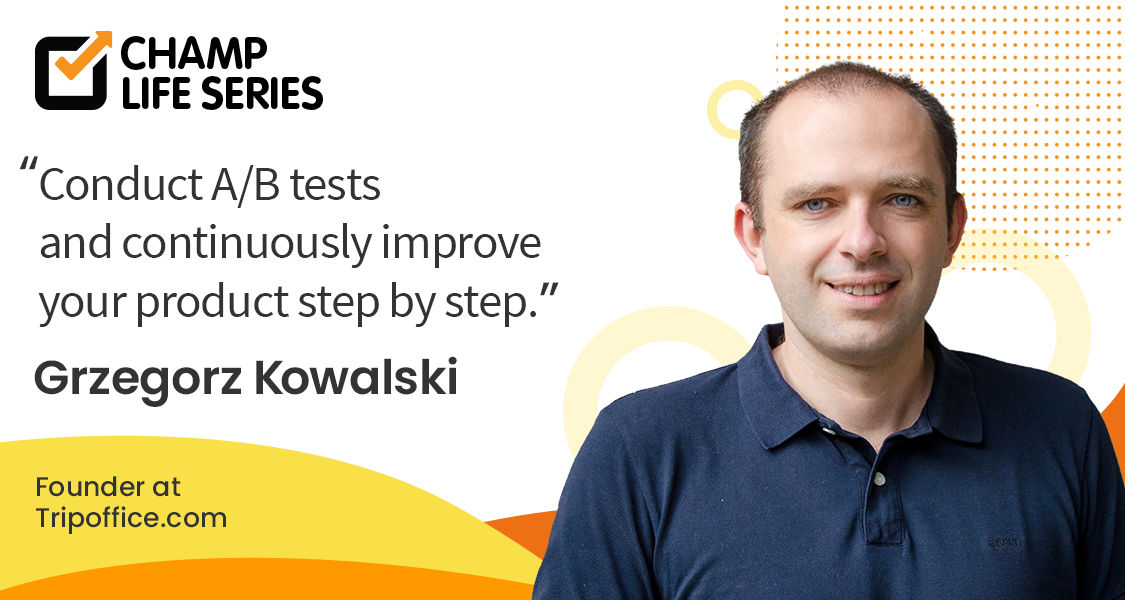In an era marked by the growing prevalence of remote work and the digital nomad lifestyle, the dynamics of travel and accommodation have undergone a remarkable transformation. At the forefront of this revolution is Tripoffice.com, a pioneering platform that has reimagined the way remote workers and digital nomads discover and select accommodations tailored to their unique needs.
In an exclusive interview with Grzegorz Kowalski, the visionary founder of Tripoffice.com, we delve into the inspiration behind the platform’s inception, the challenges and triumphs faced along the journey, the strategies employed to enhance user experience, and the forward-looking perspective on the evolving landscape of travel and technology. Join us as we uncover the insights and motivations that have propelled Tripoffice.com to the forefront of travel innovation.
Neha K: Can you share the inspiration behind starting Tripoffice.com? What drove you to create a platform for Hotel search engine for remote workers and digital nomads?
Grzegorz Kowalski: Tripoffice.com is a search engine for accommodations with workspace dedicated to digital nomads and remote workers.
I started this website because I’ve been working remotely for over 10 years, and I always struggle to find the right hotel or apartment for work.
Neha K: Could you walk us through the unique features that set Tripoffice.com apart from other platforms in the remote office?
Grzegorz Kowalski: Today, I think we might be the only ones in the tourism industry using AI to detect objects in hotel photos. We’ve trained an AI model that can recognize ergonomic chairs and desks in images. We’ve scanned over 40 million hotel photos and found around 200,000 rooms where there is a comfortable remote workspace.
Neha K: Building a successful startup often involves overcoming challenges. What were some of the major hurdles you faced during the initial phases of establishing Tripoffice.com, and how did you tackle them?
Grzegorz Kowalski: I am a full-stack developer, knowledgeable in technology, and building the website was not a big issue for me and my team. Unfortunately, it turned out that a functional product is only 5% of what’s needed for a startup to succeed. The remaining 95% is good marketing, which we are constantly struggling with.
Neha K: The travel landscapes have evolved significantly in recent years. How has Tripoffice.com adapted to these changes to provide value to both users and partners?
Grzegorz Kowalski: Yes, unfortunately, in recent years, the prices of plane tickets and transportation costs have increased significantly. The tourism industry has also been negatively impacted by inflation and economic crises. However, on the other hand, remote work has become a standard practice in many companies, and more and more people are going on several workstations.
Neha K: User experience is crucial in any online platform. How do you ensure Tripoffice.com offers an intuitive and seamless experience for travelers?
Grzegorz Kowalski: UX has a significant impact on the conversion rate in our company. Changing the color of the “Search” button resulted in a decrease in the bounce rate by a few percent.
Our search engine features a minimalist design created in accordance with the WCAG standard. We conduct A/B tests daily, improve the website’s appearance, and monitor the conversion rate. We’re also obsessed with the loading speed of our website.
The popular Lighthouse plugin for the Chrome browser always shows us the highest scores.
Neha K: Could you share a success story or memorable experience that highlights the positive impact Tripoffice.com has had on its users or partners?
Grzegorz Kowalski: I will never forget how, two years ago, I described my startup idea in a discussion group for programmers and entrepreneurs. I explained the problem I often face while planning workstations and how we plan to solve it with Tripoffice.com. My post received hundreds of positive comments, and many people admitted they were also looking for remote work-friendly hotels and apartments and had trouble finding them.
The MVP tests incredibly motivated me to work and reinforced my belief that it’s worth investing time and money in developing the Tripoffice search engine.
Neha K: As the founder of Tripoffice.com, what core values and principles have guided you in making critical decisions for the platform’s growth and development?
Grzegorz Kowalski: I base all decisions on hard data and tests. We implement new functionality, improve design, or launch PPC advertising campaigns. Then, for several days, we observed our website’s statistics. If the bounce rate drops and the conversion rate increases, it means we’ve taken a step in the right direction. If we observe declines in the statistics, we delete the new ad campaigns, revert to the old design, or remove the new features.
Neha K: With the rise of technology and changing user preferences, how do you envision the future of travel, and how is Tripoffice.com prepared to stay ahead of the curve?
Grzegorz Kowalski: No one can predict today how the tourism industry will look in a year or two. I hope that hotels won’t be closed again and people won’t start spending vacations in the metaverse. Unfortunately, anything is possible. The world is changing rapidly today, and it’s hard to say what our reality will look like in a few months.
Rapid changes in the world are often a challenge in large corporations, where decision-making processes are complex and lengthy.
For startups, the changing world and artificial intelligence are a great opportunity, not a threat.
Tripoffice.com is a small, bootstrapped company that quickly and easily adapts to changes.
Neha K: What advice would you give to aspiring entrepreneurs who are looking to create innovative solutions in the sector based on your journey with Tripoffice.com?
Grzegorz Kowalski: Follow indie hackers and the #buildinpublic hashtag on LinkedIn and Twitter.
Right now, thousands of startup founders write on social media about how they’re building their companies from scratch. Many of them also share knowledge that isn’t available in any books.
Stories about how Facebook and Uber were created are interesting but remember that these companies were established many years ago in other times. Today, startups are built somewhat differently.






